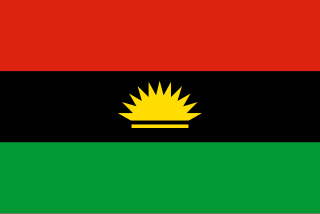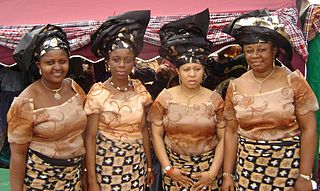
Chinua Achebe was a Nigerian novelist, poet, and critic who is regarded as a central figure of modern African literature. His first novel and magnum opus, Things Fall Apart (1958), occupies a pivotal place in African literature and remains the most widely studied, translated, and read African novel. Along with Things Fall Apart, his No Longer at Ease (1960) and Arrow of God (1964) complete the "African Trilogy". Later novels include A Man of the People (1966) and Anthills of the Savannah (1987). In the West, Achebe is often referred to as the "father of African literature", although he vigorously rejected the characterization.

The Igbo people are an ethnic group in Nigeria. They are primarily found in Abia, Anambra, Ebonyi, Enugu, and Imo States. A sizable Igbo population is also found in Delta and Rivers States. Ethnic Igbo populations are found in Cameroon, Gabon, and Equatorial Guinea, as migrants as well as outside Africa. There has been much speculation about the origins of the Igbo people, which are largely unknown. Geographically, the Igbo homeland is divided into two unequal sections by the Niger River—an eastern and a western section. The Igbo people are one of the largest ethnic groups in Africa.
Anarchism in Nigeria has its roots in the organization of various stateless societies that inhabited pre-colonial Nigeria, particularly among the Igbo people. After the British colonization of Nigeria, revolutionary syndicalism became a key factor in the anti-colonial resistance, although the trade union movement deradicalized and took a more reformist approach following the country's independence. The contemporary Nigerian anarchist movement finally emerged from the left-wing opposition to the military dictatorship in the late 1980s and saw the creation of the Awareness League.
Ifi Amadiume is a Nigerian poet, anthropologist and essayist. She joined the Religion Department of Dartmouth College, New Hampshire, US, in 1993.
The Aba Women's Riots of 1929 was a period of unrest in colonial Nigeria over November 1929. The protests broke out when thousands of Igbo women from the Bende District, Umuahia and other places in southeastern Nigeria traveled to the town of Oloko to protest against the Warrant Chiefs, whom they accused of restricting the role of women in the government. The protest encompassed women from six ethnic groups.

Catherine Obianuju Acholonu was a Nigerian author, researcher and political activist. She served as the Senior Special Adviser (SSA) to President Olusegun Obasanjo on Arts and Culture and was a founder-member of the Association of Nigerian Authors (ANA).
Francis Abiola Irele was a Nigerian academic best known as the doyen of Africanist literary scholars worldwide. He was Provost at Kwara State University, founded in 2009 in Ilorin, Nigeria. Before moving back to Nigeria, Irele was Visiting Professor of African and African American Studies and of Romance Languages and Literatures at Harvard University.

Women in Nigeria are a diverse group of individuals who have a wide range of experiences and backgrounds. They are mothers, daughters, sisters, wives, entrepreneurs, professionals, and activists. Women in Nigeria face numerous challenges, including gender inequality, poverty, and a lack of access to education and healthcare. Despite these challenges, Nigerian women are making strides in all areas of life and are becoming increasingly empowered to take control of their lives and their futures.

The Thing Around Your Neck is a short-story collection by Nigerian author Chimamanda Ngozi Adichie, first published in April 2009 by Fourth Estate in the UK and by Knopf in the US. It received many positive reviews, including: "She makes storytelling seem as easy as birdsong" ; "Stunning. Like all fine storytellers, she leaves us wanting more".
Allison Amaechina Madueke is a retired Nigerian naval officer. He was Chief of Naval Staff of Nigeria from 1993 to 1994, military governor of Anambra State from January 1984 to August 1985, and Imo State military governor from 1985 to 1986.

Nigerian nationalism asserts that Nigerians as a nation should promote the cultural unity of Nigerians. Nigerian nationalism is territorial nationalism and emphasizes a cultural connection of the people to the land, particularly the Niger and the Benue Rivers. It first emerged in the 1920s under the influence of Herbert Macaulay, who is considered to be the founder of Nigerian nationalism. It was founded because of the belief in the necessity for the people living in the British colony of Nigeria of multiple backgrounds to unite as one people to be able to resist colonialism. The people of Nigeria came together as they recognized the discrepancies of British policy. "The problem of ethnic nationalism in Nigeria came with the advent of colonialism. This happened when disparate, autonomous, heterogeneous and sub-national groups were merged to form a nation. Again, the colonialists created structural imbalances within the nation in terms of socio-economic projects, social development and establishment of administrative centres. This imbalance deepened the antipathies between the various ethnic nationalities in Nigeria ." The Nigerian nationalists' goal of achieving an independent sovereign state of Nigeria was achieved in 1960 when Nigeria declared its independence and British colonial rule ended. Nigeria's government has sought to unify the various peoples and regions of Nigeria since the country's independence in 1960.
The Kenya women's national under-17 football team represents Kenya at an under-17 level in women's football and is controlled by the Football Kenya Federation.
Prem Chowdhry is an Indian social scientist, historian, and Senior Academic Fellow at the Indian Council of Historical Research, New Delhi. She is a feminist and critic of violence against couples refusing arranged marriages.

The culture, evolution, and history of women who were born in, live in, and are from the continent of Africa reflect the evolution and history of the African continent itself.

Sitting on a man refers to an Igbo method of public shaming, often employed by women, involving the assembly at a man's hut or workplace to express grievances through dance, song, and symbolic acts such as pounding walls or removing roof thatching. This custom, also known as "making war on a man," was practiced against men and women alike, serving as a means of resistance and preserving social and political equilibrium during pre-colonial times.

Igbo nationalism is a range of ethnic nationalist ideologies relating to the Igbo people of southeastern Nigeria. While the term is defined as seeking Igbo self-determination by some, others argue that it refers to the preservation and revival of Igbo culture and, for others, the development of Igboland stemming from the philosophy, Aku luo uno, which means "wealth builds the home".

Female empowerment in Nigeria is an economic process that involves empowering Nigerian women as a poverty reduction measure. Empowerment is the development of women in terms of politics, social and economic strength in nation development. It is also a way of reducing women's vulnerability and dependency in all spheres of life. It can be noted that the aggregate of educational, political, health and legal empowerment are key to women's empowerment in Nigeria. Like many African women, Nigerian women have a subordinate role to their male counterparts. There are twice as many women below the poverty line than men and up to 19 times as many men in executive positions than women.
A Bibliography of books about African women. Entries are ordered by author alphabetically:
Nwando Achebe is a Nigerian-American academic, academic administrator, feminist scholar, and multi-award-winning historian. She is the Jack and Margaret Sweet Endowed Professor of History and the Associate Dean for Diversity, Equity, and Inclusion in the College of Social Science at Michigan State University. She is also founding editor-in-chief of the Journal of West African History. 19th Century, 20th Century, Cultural, Political, Religious, Social, Women & Gender
Nwanyeruwa, also known as Madame Nwanyeruwa, was an Igbo woman living in colonial Nigeria who gained prominence for her role in the Aba Women's Riots, better known as the Women's War. The revolt stemmed for the reluctance of Nigerian women to be taxed amidst the economic hardships of the Great Depression. After a scuffle with a male Igbo Warrant Officer, Nwanyeruwa organized 10,000 Nigerian woman in a protest against the colonial and native authorities. While the protest did not result in much concrete changes or acceptance of Nwanyeruwa's demands, it did result in woman being involved in the colonial Nigerian political system. Nwanyeruwa's actions have been appraised by several historians, who cite her actions as an important milestone in the history of African nationalism.